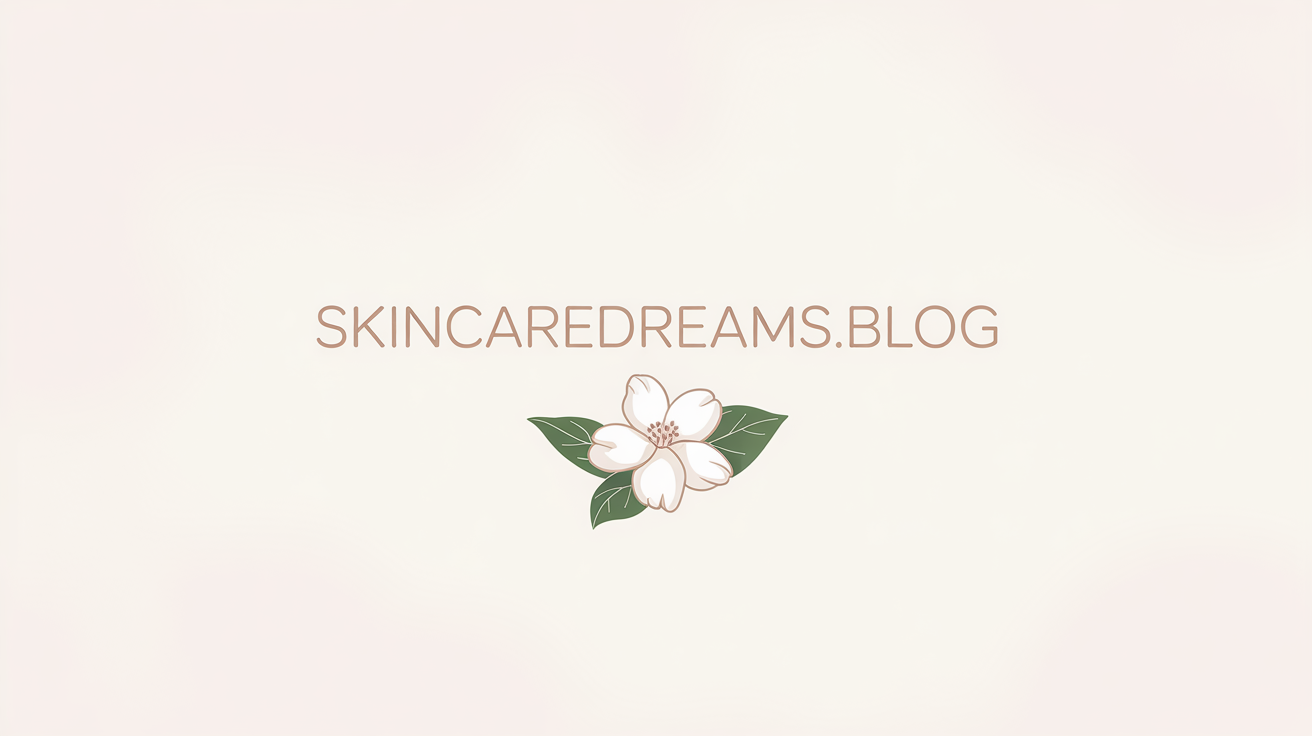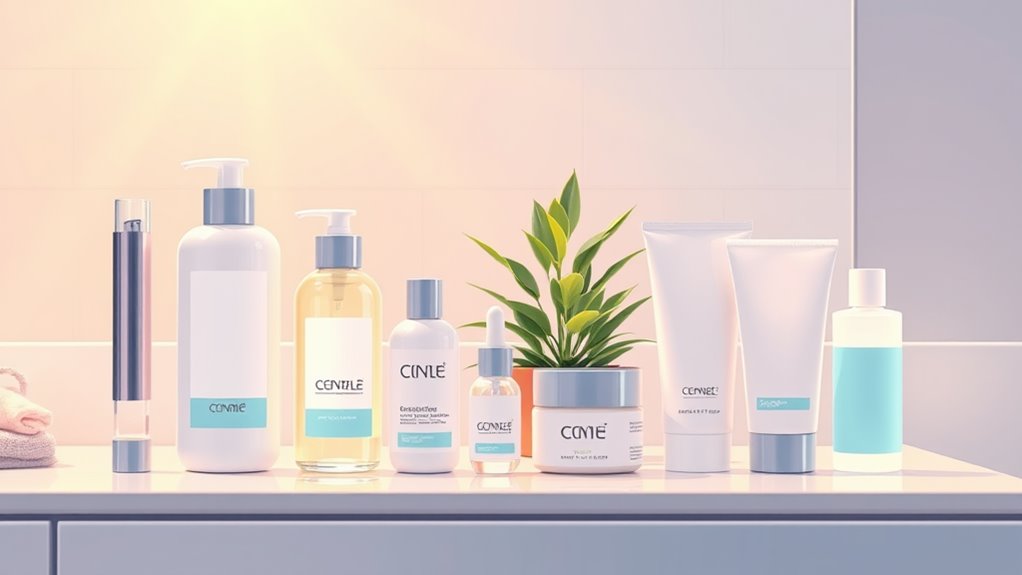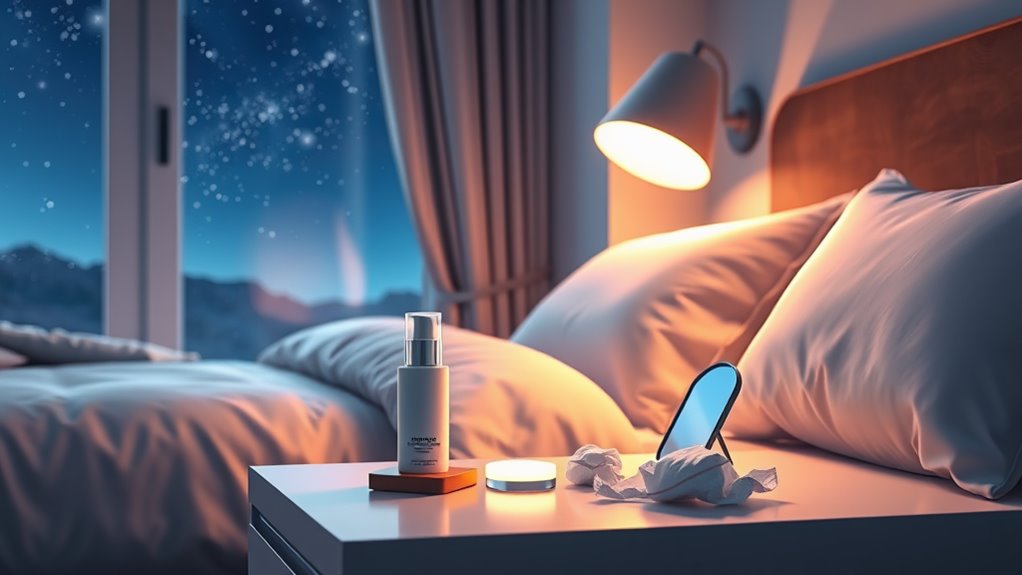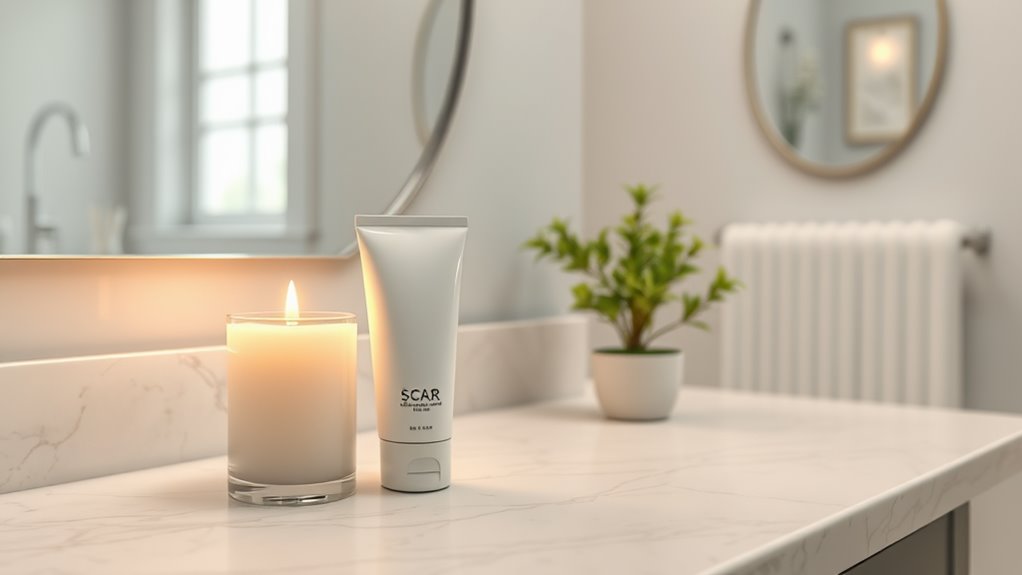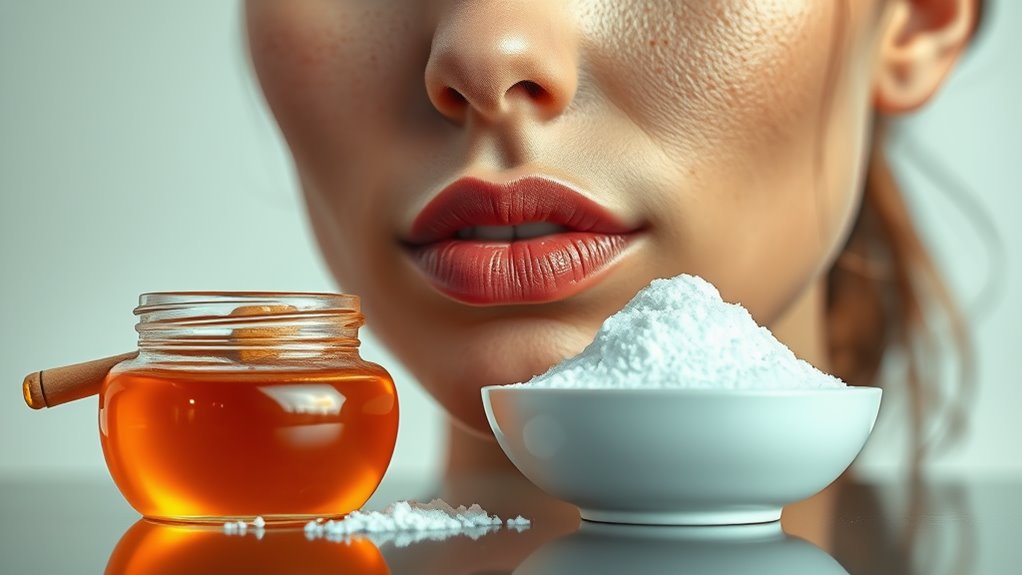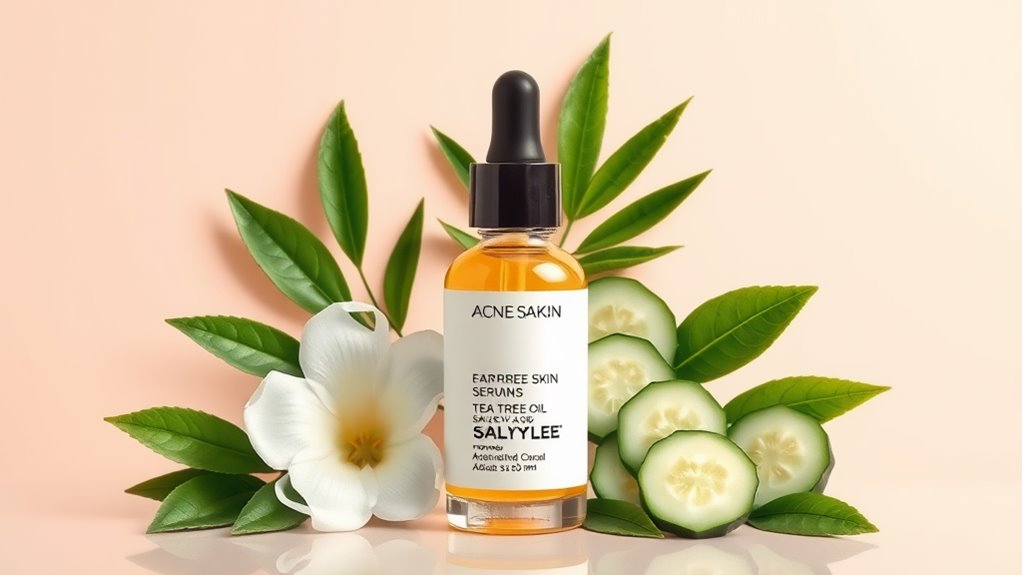The Ultimate Acne Treatment You Need Right Now
If you’re struggling with acne, you’re not alone. Finding the right treatment can feel overwhelming, but it doesn’t have to be. The key is combining effective over-the-counter ingredients with a consistent skincare routine. By understanding the types of acne and their causes, you can tailor your approach. Curious about which products work best and how to integrate them into your routine? Let’s explore the essential steps to achieve clearer skin.
Key Takeaways
- Start with over-the-counter treatments like benzoyl peroxide or salicylic acid to target acne effectively and unclog pores.
- Consider consulting a dermatologist for personalized prescription options, especially if OTC treatments fail.
- Incorporate a consistent skincare routine, including cleansing, moisturizing, and sun protection, to maintain clear skin.
- Explore natural remedies like essential oils and herbal masks for soothing and healing acne-prone skin.
- Stay hydrated and maintain a healthy diet to support your skin’s overall health and enhance treatment efforts.
Understanding Acne: Types and Causes
When you think about acne, it’s important to recognize that it comes in various forms, each with its own underlying causes.
You might encounter different types, like inflammatory acne, which includes papules and pustules, or non-inflammatory acne, such as blackheads and whiteheads.
Hormonal fluctuations, excess oil production, and bacteria can all contribute to these variations.
Understanding these distinctions is essential for selecting effective acne treatments tailored to your specific needs.
For instance, targeting hormonal acne might require a different approach compared to treating non-inflammatory types.
Over-the-Counter Acne Treatments
How can you effectively tackle acne without a prescription? Over-the-counter (OTC) treatments can be your first line of defense. These products often contain active ingredients like benzoyl peroxide, salicylic acid, and alpha hydroxy acids that help combat breakouts.
Here’s a quick comparison of common OTC options:
| Product Type | Key Ingredient | Benefits |
|---|---|---|
| Cleansers | Salicylic Acid | Unclogs pores, reduces oil |
| Spot Treatments | Benzoyl Peroxide | Targets specific blemishes |
| Exfoliants | Alpha Hydroxy Acids | Removes dead skin cells |
| Moisturizers | Non-comedogenic oils | Hydrates without clogging pores |
Choose the right product based on your skin type and concerns, and you’ll be on your way to clearer skin in no time!
Prescription Medications for Acne
Prescription medications can be a powerful weapon in your fight against acne, especially when over-the-counter options fall short.
Dermatologists often prescribe topical retinoids, which unclog pores and promote skin cell turnover. You might also consider antibiotics, which reduce inflammation and bacteria on your skin.
For more severe cases, oral medications like isotretinoin can drastically change your skin’s landscape, but they come with potential side effects that require careful monitoring. Hormonal treatments, such as birth control pills, can also help balance hormones that trigger acne.
Consulting a dermatologist is essential; they’ll tailor a plan that suits your specific needs, ensuring you’re equipped with the most effective treatment strategy.
Mastering your acne requires the right tools, and prescription medications can provide just that.
Natural Remedies for Acne
If you’re looking for a gentler approach to acne treatment, natural remedies might be your answer.
Essential oils can provide targeted benefits, while herbal face masks offer soothing properties that can calm your skin.
Let’s explore how these options can help you achieve clearer skin naturally.
Essential Oils Benefits
While traditional acne treatments often involve harsh chemicals, many people are turning to essential oils as a natural remedy.
These oils can offer numerous benefits for your skin, helping you achieve a clearer complexion without the side effects of synthetic products.
Here are some key advantages of incorporating essential oils into your skincare routine:
-
Anti-inflammatory properties: Help reduce redness and swelling.
-
Antibacterial effects: Combat acne-causing bacteria effectively.
-
Balancing oils: Regulate sebum production, preventing clogged pores.
-
Promotes healing: Accelerate skin recovery and minimize scarring.
Herbal Face Masks
Herbal face masks can be a powerful addition to your acne-fighting arsenal, as they harness the natural properties of plants to soothe and heal your skin. Ingredients like tea tree oil, aloe vera, and chamomile provide anti-inflammatory and antibacterial benefits that target breakouts.
You can create your own mask by mixing ground oats with honey, or blending yogurt with turmeric for a brightening effect. Applying these masks regularly can help reduce redness and prevent future flare-ups. Remember to patch-test any new ingredients to avoid irritation.
The Role of Diet in Acne Management
Although many factors contribute to acne, diet plays a significant role in managing this common skin condition. You can enhance your skin’s health by choosing the right foods. Focus on incorporating nutrient-dense options that support overall well-being and reduce inflammation.
Here are some dietary tips to evaluate:
-
Eat more fruits and vegetables: They’re rich in antioxidants and vitamins that promote skin health.
-
Include healthy fats: Omega-3 fatty acids found in fish and walnuts can reduce inflammation.
-
Limit high-glycemic foods: Foods like white bread and sugary snacks can spike insulin levels, worsening acne.
-
Stay hydrated: Drinking plenty of water helps maintain skin elasticity and flushes out toxins.
Implementing these dietary changes can make a real difference in your acne management journey.
Skincare Routines for Acne-Prone Skin
Creating a skincare routine for acne-prone skin is essential for managing breakouts effectively.
You’ll want to focus on morning essentials, nighttime treatments, and weekly exfoliation tips to keep your skin clear and healthy.
Let’s explore these key steps together to build a routine that works for you.
Morning Routine Essentials
When you start your day, establishing a consistent morning skincare routine can make a significant difference for acne-prone skin.
Focus on simplicity and effectiveness to set the tone for a clear complexion. Here are some essentials to include in your routine:
-
Gentle Cleanser: Use a sulfate-free cleanser to remove impurities without stripping your skin.
-
Exfoliating Toner: Incorporate a toner with salicylic acid to help unclog pores and prevent breakouts.
-
Lightweight Moisturizer: Choose an oil-free, non-comedogenic moisturizer to hydrate without causing acne.
-
Broad-Spectrum Sunscreen: Always apply a sunscreen with SPF 30 or higher to protect your skin from harmful UV rays.
Nighttime Treatment Steps
After a day of protecting your skin, your nighttime routine is where the real healing happens, especially for acne-prone skin. Start by gently cleansing to remove impurities and excess oil. Next, apply a targeted treatment, focusing on areas with breakouts. Finally, seal in moisture with a non-comedogenic moisturizer to prevent dryness.
| Step | Product Type | Purpose |
|---|---|---|
| Cleanser | Gel or Foaming | Remove dirt and oil |
| Treatment | Spot Treatment | Target active breakouts |
| Moisturizer | Lightweight Gel | Hydrate without clogging |
Weekly Exfoliation Tips
How often do you think about exfoliating your skin?
Regular exfoliation is essential for acne-prone skin, helping to remove dead cells, unclog pores, and promote cell turnover.
Here are some tips to integrate weekly exfoliation into your skincare routine:
-
Choose the Right Exfoliant: Opt for chemical exfoliants like AHAs or BHAs that target acne without harsh scrubbing.
-
Frequency Matters: Exfoliate once or twice a week to avoid irritation and maintain skin balance.
-
Apply Gently: Use a soft cloth or your fingertips to apply exfoliants, focusing on problem areas without overdoing it.
-
Follow Up with Hydration: After exfoliating, always apply a soothing moisturizer to keep your skin hydrated and prevent dryness.
Master these techniques, and watch your complexion improve!
The Importance of Sun Protection
While you might focus on treating acne, neglecting sun protection can hinder your progress. When your skin is healing, it’s particularly vulnerable to UV rays, which can exacerbate inflammation and lead to post-inflammatory hyperpigmentation.
This means that those pesky dark spots could linger long after your acne clears. By applying a broad-spectrum sunscreen every day, you’re not just protecting your skin from sun damage; you’re also supporting your acne treatment efforts. Additionally, common daily habits can accelerate skin aging, making sun protection even more crucial.
Look for a lightweight, non-comedogenic formula to avoid clogging pores. Reapply every two hours, especially if you’re sweating or swimming.
Incorporating sun protection into your routine can make a significant difference in your skin’s overall health and appearance, ensuring your hard work pays off.
When to See a Dermatologist
Knowing when to see a dermatologist can be essential for effectively managing your acne. If you’ve tried over-the-counter treatments without success or if your acne is worsening, it’s time to consult a professional.
Dermatologists can provide tailored solutions and prescription medications that may be more effective for your specific skin type.
Consider seeing a dermatologist if:
- Your acne is painful or inflamed.
- You’re experiencing scarring or dark spots.
- It affects your self-esteem or mental health.
- You have persistent acne beyond your teenage years.
Taking these steps can help you achieve clearer skin and enhance your confidence.
Tips for Maintaining Clear Skin
After consulting a dermatologist, maintaining clear skin becomes a top priority. To achieve this, follow these essential tips:
| Tip | Description |
|---|---|
| Consistent Cleansing | Cleanse your face twice daily with a gentle cleanser to remove dirt and excess oil. |
| Hydration is Key | Drink plenty of water and use a non-comedogenic moisturizer to keep your skin balanced. |
| Sun Protection | Apply broad-spectrum sunscreen daily to prevent damage and dark spots. |
Incorporating these practices into your routine will help you master the art of clear skin. Additionally, using products with proven ingredients known to fade dark spots can enhance your results. Stay disciplined and monitor your skin’s response, adjusting as necessary. Consistency is vital for long-term results and confidence in your skin.
Frequently Asked Questions
Can Stress Really Affect My Acne Breakouts?
Yes, stress can definitely impact your acne breakouts. When you’re stressed, your body produces more cortisol, which can lead to increased oil production and inflammation. Managing stress is essential for healthier skin and fewer breakouts.
Is It Safe to Pop My Pimples?
Popping your pimples isn’t safe; it can lead to infections and scarring. Instead, focus on proper skincare and treatment options. Patience pays off, and your skin will thank you for avoiding this tempting habit.
How Long Does It Take for Acne Treatments to Work?
Acne treatments usually take four to six weeks to show noticeable results. You should stay consistent with your routine, and don’t get discouraged—patience is key to achieving clearer skin and mastering your regimen.
Can Acne Scars Be Treated Effectively?
Yes, you can effectively treat acne scars. Options like laser therapy, chemical peels, and microneedling promote skin regeneration. Consult a dermatologist to tailor a treatment plan that suits your specific skin needs and goals.
Are There Specific Cosmetics That Can Worsen Acne?
Certain cosmetics, especially those containing heavy oils, fragrances, or comedogenic ingredients, can worsen acne. You should opt for non-comedogenic, oil-free products to help maintain clear skin while enhancing your overall appearance.
Conclusion
To maintain clear skin and tackle acne effectively, stick to a consistent routine that includes gentle cleansing, hydration, and targeted treatments. Don’t underestimate the power of sunscreen and a healthy diet in your journey. If over-the-counter options aren’t cutting it, don’t hesitate to consult a dermatologist for personalized advice. Remember, patience is key—clear skin takes time, but with the right approach, you can achieve the healthy complexion you deserve. Keep at it!
